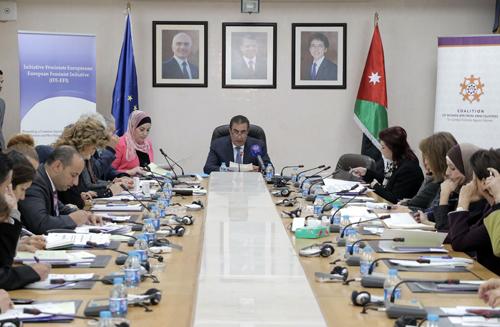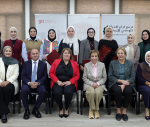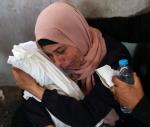You are here
Activists discuss study on Euro-Med ministerial meeting on women empowerment
By Rana Husseini - Mar 24,2016 - Last updated at Mar 24,2016
AMMAN — Participants in a study on the Euro-Med Ministerial Conclusions on Strengthening the Role of Women in Society and its impact on Jordan called on Thursday for applying its findings in the state’s policymaking and its work plan to advance women’s status.
On Wednesday and Thursday, activists, government officials, and representatives of various governorates gathered in Amman to discuss the study’s findings and the best means to implement it on the ground to ensure gender equality.
The Euro-Med Ministerial Process on “Strengthening the Role of Women in Society” is a tool for promoting and supporting women’s rights and gender equality in the whole region, said Boriana Jönsson, executive director at the Euro-Med Feminist Initiative.
The third Ministerial Conference 2013 held in Paris as part of the process reaffirmed the importance of this initiative, especially in the context of the ongoing political transformations in the Southern Mediterranean, recognising the important role women play in them, Jönsson explained.
The study discussed this week was implemented by the Euro-Med Feminist Initiative, a network of women’s rights organisations from 20 countries from the two shores of the Mediterranean, over a year under the Ministry of Political and Parliamentary Affairs’ “Support to Democratic Governance in Jordan” programme funded by the EU.
Lilian Halls French, co-president of the Euro-Med Feminist Initiative, said the study is a tool to organise multi-sector discussions on local and national level, utilising the Paris Ministerial Conclusions as a policy document.
It strives to offer better knowledge of the perception, role and impact of the Ministerial Conclusions in Jordan, according to French, providing an up-to-date overview of the status of women’s rights in Jordan and elaborating on policy recommendations in the context of the upcoming fourth Ministerial Conference planned for 2016.
The participants warned that equality and women advancement should not be at the cost of security and fighting terrorism.
“People’s priority is security, but this issue is being exaggerated and it does not mean that we should stop calling for women’s rights and equality,” said Laila Naffa, from the Arab Women Organisation.
Others called on the women’s movement to form a strong and effective group to lobby politicians and the governments to keep women’s issues on the government’s table.
“We have had enough of workshops and lectures… it is time the women’s movement formed real pressure groups that would lobby the government and follow up on its compliance with the international conventions when it comes to women’s issues,” said Jerash MP Wafaa Bani Mustafa.
Bani Mustafa accused the government of “schizophrenia” because “it provides a modern dialogue for the West but back home it is a different story”.
“The real reform by the government should be for Jordanian men and women and not to improve the image of Jordan abroad,” the lawmaker added.
Turning to education, the participants said the government should take concrete steps to improve women’s image and role in school textbooks.
“The image of women in school textbooks is still limited to certain professions,” said Jordanian National Commission for Women Secretary General Salma Nims.
Political and Parliamentary Affairs Minister Khaled Kalaldeh, who addressed the gathering on Wednesday evening, said women’s political participation has witnessed an increase especially after the introduction of quotas in municipal councils and in Parliament.
“Allow me — women of Jordan here and elsewhere — to whisper [in your ears]: why don’t you ask for your rights for a quota in professional and labour unions as well as in political parties and civil society organisations?”
“Why don’t these institutions designate seats for women on their boards and councils?” the minister asked.
Summary of conclusions
•Gender sensitive education and awareness raising for women and men are crucial to counteract the negative impact of culture and traditions on women’s rights
•Discriminative laws must be amended or annulled
•Mainstreaming gender equality on a ministerial level should be done through the creation of an operational mechanism
•Governmental measures supporting meaningful participation by women in all spheres of public life should become a priority
•Promotion of women’s leadership is a necessity to support their access to decision-making spheres
•Dialogue between decision makers, opinion leaders and women’s rights organisations is key to developing a society where women and men are of equal worth
•Jordan can and should strengthen its leading role in the Euro-Med Ministerial Process
Related Articles
AMMAN — Women’s activists on Monday met with Lower House MPs to discuss the outcome of a study on the Euro-Med Ministerial Conclusions on St
AMMAN — Minister of Social Development Hala Lattouf last week stressed the need to further strengthen women’s role in the Mediterranea
BEIRUT — Minister of Social Development Wajih Azaizeh on Monday called for a comprehensive study that would examine the deep impact of the s

















